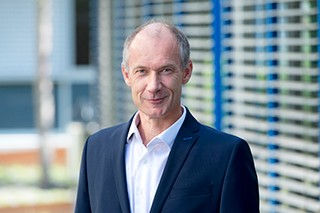Posted: March 1, 2023

Photo: Fraunhofer IBP
Anyone interested in research in the field of efficient lighting in buildings will definitely come across Jan de Boer. He chairs the Lighting Technology and Passive Solar Systems Group at the Fraunhofer Institute for Building Physics in Germany. Since 2013, de Boer has also led groups of scientists and practitioners in the field of lighting globally within the IEA Solar Heating and Cooling Programme. Together with this team of IEA SHC researchers he published a technology position paper titled Integrated Daylighting and Electric Lighting in Non-residential Buildings in December 2022. In the same month the IEA SHC Programme approved the start of his third lighting task. De Boer is now inviting interested lighting specialists to the kickoff meeting of Task 70 titled Low-Carbon, High-Comfort Integrated Lighting on 17 to 19 April in Aversa, Italy.
“In this new task we will widen the rating perspective of lighting solutions in the context of decarbonisation and energy efficiency,” explained de Boer. “The energy demand for lighting can be drastically reduced by the combined effect of more efficient light sources, advances in controls and raised awareness about the integration of daylighting and electric lighting.”
Therefore, one of the research areas focused on by the new task is digitalisation. “We will continue our work in the field of digital data and advanced functional models right up to automatic planning and improving the digital twin of the whole lighting value chain,” said de Boer, listing some of the activities planned.
The Task 70 team would also like to continue to work on case studies as they did successfully in the previous Task 61. A total of 25 fact sheets, each four pages long, describe projects in twelve countries. The factsheets summarise the monitoring data for integrating daylighting and electric lighting solutions with respect to energy use, visual and non-visual performance, and users’ satisfaction. You can download all 25 factsheets here: https://task61.iea-shc.org/publications
The new task 70 is planned for a period of 3.5 years and will end in June 2026. The series of semi-annual meetings will start in April in Italy. If you are interested in participating, please contact Jan de Boer: jan.deboer@ibp.fraunhofer.de
Action needed on the way towards sustainable lighting solutions
The previous IEA SHC Task 61 on Integrated Solutions for Daylighting and Electric Lighting ended with the publication of a technology position paper. On just a few pages, the researchers described the status quo of lighting technologies and daylighting. They also discussed the potential improvements in this field of technology and the actions needed on the way towards efficient and sustainable lighting. Here are some of the paper's key statements:
- The worldwide lighting market currently has a turnover of around USD 75 billion (2022) at an expected annual growth of 6%.
- LED lamp efficiency is now close to the theoretical maximum of around 230 lm/W for white light, so no further large improvements are to be expected here. In current practice, luminaire efficacies of at least 150 lm/W should be the benchmark. Recent advances in LEDs instead relate to the field of better colour rendition, with so-called full-spectrum LEDs with more balanced, better-accepted spectra.
- The façade market has grown significantly worldwide in recent decades. Today, around 1.3 billion m2 of glazed facades (the equivalent of the area of the city of London) are constructed every year.
- Among the shading systems, electrochromic switchable glazing is expected to increase in popularity as its colour-rendering properties are especially significant when it is used on a large scale.
- Commissioning and maintenance processes need to be improved and become standard practice. Otherwise, efficiency might be jeopardized.
- Digitalisation is a critical success factor for low-carbon lighting and goes hand-in-hand with profitable future business models.
Websites of organisations mentioned in this news article: